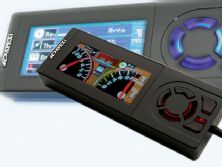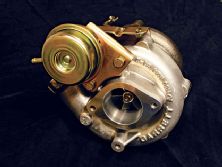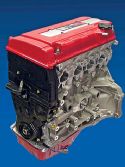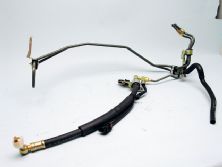Question Of The Month
Q First of all, love your magazine. Keep up the good work. I got my '02 RSX-S about six months ago and so far the only mod I got is the V-2 intake, but I'm planning to mod my car with either a Jackson Racing race header, HKS Hi Power exhaust, Hondata K-Pro and Jackson Racing supercharger Race version; or keeping it NA with a Toda Race header, Fujisubo Power Getter exhaust and the Toda N2 engine kit. Can you guys tell me the difference in power between the two plans? Please give me any suggestion you guys have on my plan. I really want to take my car to the next level. I'm looking for producing about 280hp and atleast 200 lb-ft at the wheel. What's my best route?
Brian Wong
Via the Internet
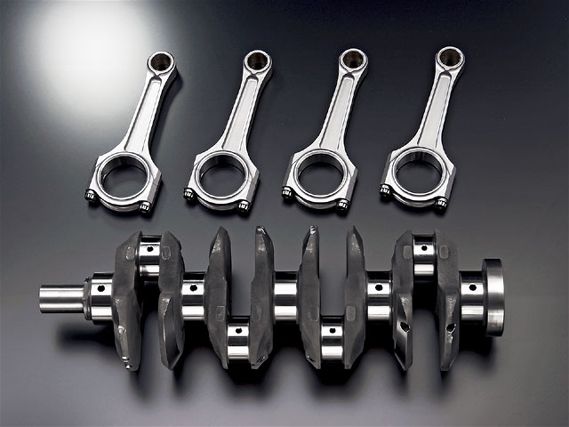 | Where We Cure All Your Tech Problems - Tech Support
| Where We Cure All Your Tech Problems - Tech Support
A That's always a tough call between boost and NA. The K20 in the RSX has so much potential as we and other magazines proved in the RSX Challenge a little while back. As for raw pedal-to-the-metal power, you can refer to Nads' car as a perfect example because he's running the Toda engine kit with all the goodies slapped on. His setup was good for 258hp and 198 lb-ft of torque at the wheels. The only gripe, if you can even call it that, is that the car pings if he doesn't run very high-octane gas because of the high compression. That's not such a bad thing, but those gas receipts can add up pretty quickly (They sure do! - JN). From what we've heard, he can floor it in third gear and still smoke the tires. That's power for an old man-mobile (Haha! Wait a minute... - JN). Also, his setup is not smog-legal as his header eliminates the catalytic converter. Something like that might not concern you, but it's always good to keep in mind. One of the other challengers in the RSX event had a Jackson Racing supercharger and it made just over 230hp. Though that's 50 off your goal, you get immediate response from the charger and refrain from tearing apart your motor. If you keep things tidy, you'll even be able to pass smog. Clean air is always good.
Q Super Street people, I need help. I have an '05 Nissan 350Z and have installed the GReddy twin-turbo kit. However, I'm experiencing mild detonation at low rpm during mid to full throttle. I have had the car tuned and was recommended to have the timing retarded about two degrees. I contacted GReddy tech support and after discussing my issue I discovered that the e-manage allows me to manipulate the fuel and boost only. Then I contacted Technosquare Inc. in Torrance but they don't have a re-flash for '05 models. I guess they can't crack the software yet. I have been waiting two months now for them to do something, but they keep giving me lame excuses. HKS does have an ECU that I can't recall the name of at this moment, but it's way too expensive-about $3,000. So my question is, do you know of anyone that can re-flash my ECU? Please help. My car is a daily driver and I'm not convinced that the use of colder spark plugs will solve my problem.
Gerard Abadjian
Via the Internet
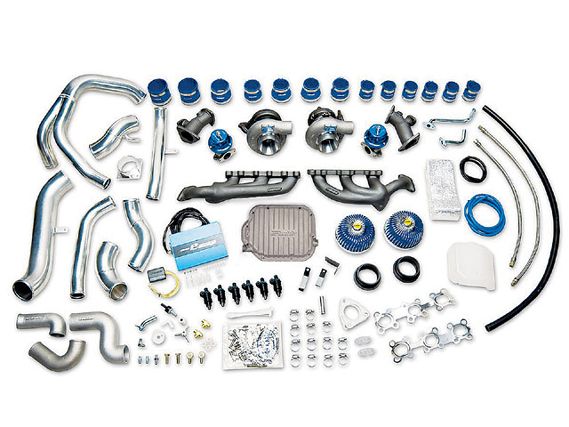 | Where We Cure All Your Tech Problems - Tech Support
| Where We Cure All Your Tech Problems - Tech Support
A If you think you're detonating, that's a bad sign. We hate to ask this question, but what kind of gas are you using? If you're going for the cheapo low-octane stuff then it's time to step it up. If you're already using 91-octane then think about throwing in half a tank of 100 or even some octane booster. This would be a quick fix for your detonation problem. As for the GReddy e-manage, what you heard was only partially correct. Yes, the base unit only allows for adjustments to the fuel maps, but you can purchase an optional harness to control the ignition through a 16x16 map. With these tools, an experienced tuner will be able to fix your detonation problem in no time. The HKS unit you're referring to is the F-Con V Pro. It's a more in-depth engine management system and well worth the cost. It's a lot less than the $3,000 (about $1,400) you were expecting to spend. Another option is to go with a universal AEM EMS system. It's also a very advanced tuning system. Both can be installed as piggy-back units or standalones if you wire them correctly. However, in an attempt to save you money, we'd say to maximize your e-manage with all the optional harnesses, mainly because you already have the unit and it's less expensive to add on to it than to buy a new one. Plus, the optional features will give you a wider tuning range and will more than likely fix any issues you're having right now. Who knows, you might even drive away from the dyno a few horsepower richer. Now wouldn't that be nice for a change?
Q Hey Super Street. I currently have an '02 WRX and have an HKS SSQV, intake and Hi-Power exhaust. I am looking into purchasing a downpipe and up-pipe and I'm a number puncher so the gain is what matters the most to me. I know whenever any company claims they dyno-tested their merchandise it is set under a specific set of variables. What variables should I consider when picking out a downpipe. I already noticed that downpipes without catalytics have a tendency to make 3-4hp more than catted ones, but what variables should I consider when choosing a up-pipe and downpipe that will be installed on a daily driver and track runner?
Jerry Turner
Florida
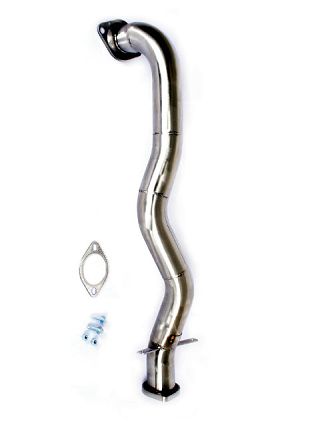 | Where We Cure All Your Tech Problems - Tech Support
| Where We Cure All Your Tech Problems - Tech Support
A When it comes to downpipes it's hard to say which one you should buy. Really, there are only so many designs that companies can utilize so they're usually similar. The horsepower numbers that manufacturers give out are really hard to base your decision on, mainly because of all the different types of dynos out there and the factors that go into a dyno session. Manufacturer A could have tested their product on a colder day with a lower-mileage car on a higher-reading dyno than Manufacturer B did and so on. So try to eliminate the advertised horsepower number from your decision making process, even though that's not as easy as it sounds. Taking that into consideration, you should look at the quality of whichever unit you're planning on buying: whether or not they used high-grade steel with quality welds. Remember that these are going to bolt onto the turbo, which gets extremely hot. The last thing you want to deal with is a cracked downpipe or up-pipe.
Q I know many a thing about cars, and well, one thing still stumps me. I understand that the ECU takes over the older, more outdated carburetors, and is much more efficient. Now, I always hear about people playing with their ECUs, but what for? Fuel efficiency and horsepower? Oh, and if I were to get a turbocharger or ported and polished my head, would I need to swap my ECU for something that could handle the added power? And if I do need to swap out the ECU, what are the consequences of not doing so? Thanks for your help, Super Street, I appreciate it.
John Steel
Via the Internet
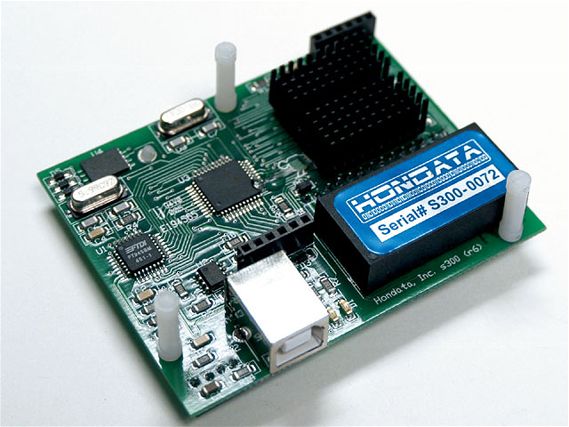 | Where We Cure All Your Tech Problems - Tech Support
| Where We Cure All Your Tech Problems - Tech Support
A Think of the ECU as the brain of your car because that's pretty much what it is. It controls everything, from the fuel timing all the way down to your air conditioner. It's not as simple to play with an ECU as it sounds. You can't just crack it open and start fiddling with your timing. You actually have to get a chip or re-flash from a company that has the ability to do that. When you add on a turbo or do other engine work, it's ideal to tweak the fuel and timing to extract the most amount of horsepower out of your setup, not to mention the need to keep your car running at a safe level. As an alternative, you can use a fuel controller to do the same deed just as well.
Q I have a '97 Civic CX hatch and I hit a pole with it last May. At the moment it's sitting in my brother's garage looking all depressed and busted with its Type R carbon fiber wing and 17-inch Kosei K1 wheels. It's getting fixed this spring. Right now it has the same D16 it came with. It sucks. I have no intention of spending $1,500 on fixing the car so I can have a 16-second Civic again. It makes my head hurt with all the different motors that I can get for the car and all the ups and downs to each motor. I thought I wanted a B16 but then I heard that they're not all that great, so I'm thinking I should get a B18 'cause Integras are fast, right? All I want is a motor I can supercharge and pull mid- to low-13s in the quarter-mile, with a lot of other parts of course. Do you think I should go with the B18 or B16? If I go with the B18, which is the best. I think there's 200 different ones, right? Is the one that came in the US-spec GSR good and worth getting, or should I get whatever the J-spec one is? I'm pretty sure I don't want a H22. Yeah, they're cheap and fast but won't they screw up the handling on my car with all the added weight in the front of my car? The car will see some drag strip duty but that's not what I'm building it for. I really don't have any idea and, like I said, my head hurts with all this and yours probably will too after reading this. Anthony Ilax Iowa
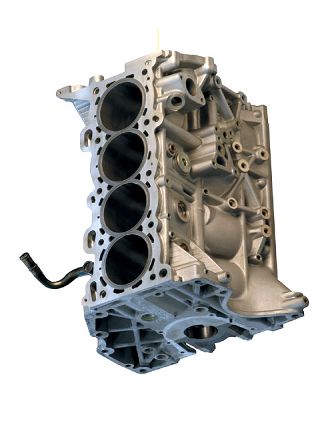 | Where We Cure All Your Tech Problems - Tech Support
| Where We Cure All Your Tech Problems - Tech Support
A We get Honda-engine-swap inquiries left and right. There are so many various combinations of the motors out there that it's hard for us to tell you exactly which one to get. Any of the B-series engines with the proper bolt-ons would get your task done, especially if you're planning on throwing a supercharger on it. The CX is a pretty light car and even a B16 swapped in with intake, headers and exhaust would probably get you into the mid- to low-14s. Throw on some sticky tires and put a good driver behind the wheel and you'll be closer to your goal than you think. Once you get that supercharger installed, you should be knocking in low-13s in a very street-capable car. Our only concern is the body damage. If the chassis isn't straight anymore, you're going to have issues going down the track, not to mention the awkward handling from any tweaks there might be to your suspension.
Q First off, I'm not going to start with a bunch of you-are-the-best-magazine-I-love-you because you already know that and people have already told you that before, so I'm just going to get straight to the point. I've been reading a lot about tuning lately, and I know that it's pretty simple to tune the fuel curve with a wide-band 02 that shows me the fuel ratio on a display. So my question is, what can be done about the ignition? I want to be able to tune on the street without having to spend the extra cash on dyno time, so what is a way of street-tuning the ignition safely and without a lot of really expensive equipment. From what I've heard, you can do this with a tool that reads exhaust gas temperatures by knowing that EGT's drop as detonation begins, but how accurate is this method and how easy would it be for a just-starting-out newb like me? Is there any other relatively cheap and simple way of street-tuning the ignition that you guys know of? I'm eventually planning on running a mildly-boosted B18b with around 9 or 10 psi once I get a car to drop it in, so tuning and getting the most power I can with stock internals will be important. Thanks for any help, and keep up the good work!
David
Boise, ID
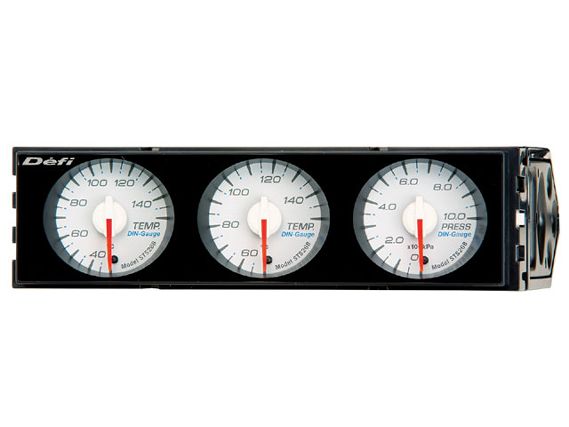 | Where We Cure All Your Tech Problems - Tech Support
| Where We Cure All Your Tech Problems - Tech Support
A First off, we don't suggest tuning your car on the street. As far as reading the timing, that's also based off the numbers you get from the wide-band O2 sensor. The air/fuel mixture readings tell more than what you think. Sometimes your car might be running too rich or lean because the timing isn't set properly so rather than adding or pulling away fuel, you need to advance or retard the timing. The EGT is somewhat accurate when used in tuning mainly because when your car is running lean, the gas temperatures are generally higher. But it's not always a sure thing since prolonged driving and different scenarios can increase the exhaust temps as well. On a stock internal B18 motor you should be able to drop some decent power on 9 or 10 lb-ft of boost with just a fuel pump and regulator. Thinking back, what exactly are you going to tune your fuel and timing with anyway? Do you have an aftermarket controller or engine management system, because that would be ideal. If not, are you just going to play with the timing from the distributor? Whatever the case might be, do it safely and don't try to push the motor beyond its limits just to get a couple more horsepower out of it.


